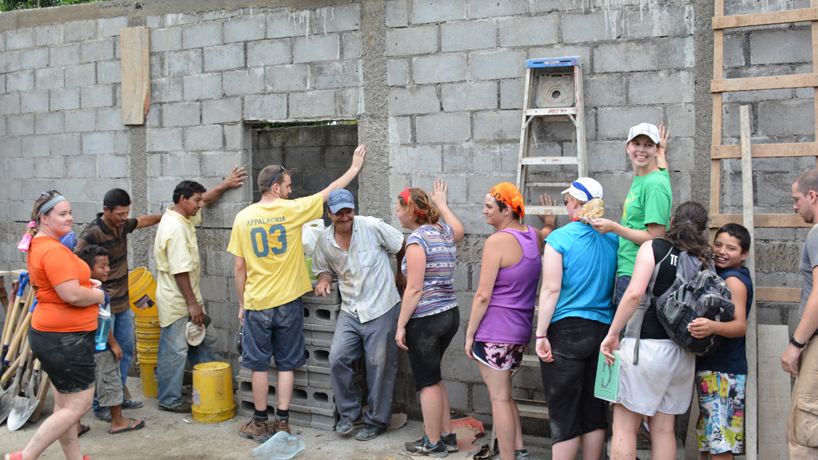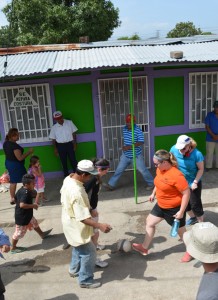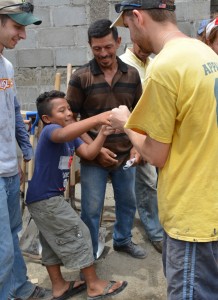
After a week of intense work building a much-needed home in Managua, Nicaragua, members of a UMSL Catholic Newman Center service team pause to bless the structure alongside the new owners of the house. (Photos courtesy of trip participant Rob Perry)
For a family in Managua, Nicaragua, what started as a crowdfunding idea at the University of Missouri–St. Louis last winter has resulted in a new, much-improved home.
“By raising the funds we did, we built a home for Felipe, Junior and the rest of their family,” said UMSL senior public policy major Belkisa Dautovic, one of the students who recently spent a week in the country as members of a UMSL Catholic Newman Center service team. “It was intense, but the result was unbelievable.”

Frequent games of soccer in the street served as welcome breaks during mornings spent mixing cement, pouring floors, stacking cinder blocks and tying rebar.
UMSL’s Newman Center, which celebrated its 50th anniversary on campus in 2014, has a reputation for service in the local community. But when a UMSL staff member suggested that students and others involved with the center help launch a UMSL crowdfunding platform online, plans for the center’s first international service trip began to take shape.
“The initial invitation to the UMSL crowdfunding effort is what helped us birth the idea and made it possible,” said Erin Duffy-Burke, assistant director of the Newman Center. “It got a lot of people involved, created a lot of momentum for advertising and got us over the initial chunk of fundraising.”
Composed of UMSL students, alumni and community members, the trip participants raised $7,800 through crowdfund.umsl.edu and a grand total of $23,975 when combined with bake sales, fish fries, a car wash, trivia night and more. Together with the $300 that each participant paid out of pocket, the funds covered the cost of building the house and also supported educational opportunities for children in Managua.
“It was a lot of work, but absolutely worth it,” Duffy-Burke said of the fundraising efforts. “In Nicaragua, we worked with an organization called Hand in Hand Ministries. Their primary focus is educational support for very low-income families, in the hopes of providing better education for the children and therefore a way out of poverty.”

Newman Center trip participant Matt Bono (at left) and Felipe (center), whose family now owns and lives in the new house, smile as Felipe’s grandson, Junior, exchanges a fist bump with UMSL alumnus Sean Leahy at the construction site.
UMSL alumnus Matt Bono, BS engineering 2009, said he was struck by the obvious joy and appreciation expressed by the new homeowner, whose family of six previously lived in a small tin structure.
“We had many discussions about the culture and about God, but I think the most lasting thing is that they have a more comfortable place to live,” Bono said.
From July 12 to 19, the UMSL-affiliated group spent each morning mixing concrete by hand, carrying buckets, grouting in and stacking cinder blocks, and tying rebar for the structural beams. In the afternoons, participants visited local schools and shops, spent time with students in a scholarship program and enjoyed the natural beauty of Nicaragua.
“Managua is the poorest city, and Nicaragua itself is the poorest country in Central America,” Dautovic said. “Even though most of the people live on less than $4 a day, there is a strong sense of community, and we enjoyed games of soccer on the dirt road – no one had lawns – with everyone we met.”
She was surprised by the number of dogs walking the streets in search of food.
“Animals are not kept as pets, and food and care for them is too expensive for most people living in Nicaragua,” Dautovic said. “It was either food for the dog or food for the family.”
Now back at UMSL for a final year of undergraduate study, Dautovic said she also has been reflecting on some similarities between Nicaragua and the United States.
“We’re still struggling for better pay, jobs and government,” she said. “In Nicaragua, 300 families are having their land, their livelihood, auctioned away [because of a deal] to construct a canal – larger than the Panama Canal – right across the country without conducting any environmental studies.
“Farmers are still marching in protest, but their voice is small compared to the money the investors and the politicians will make. The same could be said about proposed plans in America, like the pipeline, that will have huge environmental impacts many don’t want to admit.”















